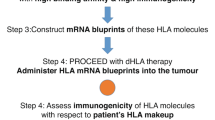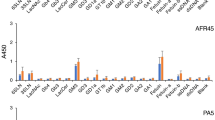Abstract
A simple rapid micro-agglutination test for detecting sensitized lymphocytes from human peripheral blood is described: the poly-L-lysine (PLL) 3400 agglutination test of lymphocytes (PAL test). The incubation of lymphocytes from 30 cancer patients, 30 patients with non-malignant disease and 40 healthy controls with PLL (mol. wt 3400) is evaluated. The test was positive in 83 percent of malignant and 20 percent of non-malignant cases. All healthy controls were negative. Other peptides tested showed no significant difference in reaction between malignant and non-malignant diseases. The mechanism of detection of sensitized lymphocytes from patients with malignant disease through agglutination induced by PLL 3400 is discussed.
This is a preview of subscription content, access via your institution
Access options
Subscribe to this journal
Receive 24 print issues and online access
$259.00 per year
only $10.79 per issue
Buy this article
- Purchase on Springer Link
- Instant access to full article PDF
Prices may be subject to local taxes which are calculated during checkout
Similar content being viewed by others
Rights and permissions
About this article
Cite this article
Bauer, H., Ax, W. Detection of sensitized human blood lymphocytes by agglutination with basic peptides: a possible test for malignant disease. Br J Cancer 36, 708–712 (1977). https://doi.org/10.1038/bjc.1977.253
Issue Date:
DOI: https://doi.org/10.1038/bjc.1977.253
This article is cited by
-
Usefulness of the PAL test in the diagnosis of lung cancer
Journal of Cancer Research and Clinical Oncology (1982)



